I presume this is because you're not a historical scholar? Why would you have found this? There's very very few who doubt the historicity of Jesus. He's much more evidentially supported than Homer, Pythagorus, Sun Tzu, and many other that I presume you've never doubted
Like I said further down in the post you quoted me from, ‘And you may say, but there isn’t truly reliable evidence of many people from that time - and you’d be right - but Jesus is supposed to be the most important human that’s ever lived so I’m looking for much more weighted evidence for his existence than anyone else’s’.
And I may have because - despite being an atheist - I think mythologies and the real history around them is very interesting and I’ve done a lot of reading about it.
For example, there’s no evidence of Hebrews being slaves to Egypt. Also, when the Hebrews supposedly escaped from Egypt, crossed a body of water, wandered for 40 years in the desert and then came upon the Promised Land (some time between 1,400-1,200BCE), the entirety of their journey was actually all in Egypt because Egypt between the reigns of Thutmos III and Rameses II went right across the Levant, up past the Euphrates up towards Armenia.
The story of Moses - just like Jesus - is just an amalgamation of numerous older stories from other mythologies, including Egyptian mythology itself.
I haven’t doubted those historical figures because there isn’t a story of Homer making blind men see and lame men walk, there isn’t a story of Pythagoras walking on water and there isn’t a story of Sun Tzu coming back to life after being executed… so even if the Iliac was written a long time after Homer supposedly lived, Pythagoras thought planets sang to each other or there wasn’t actually anyone called Sun Tzu who masterminded military strategy, they don’t have an entire religion being followed in their name so haven’t made me read too much into their historicity.
At the time of Jesus’ supposed life and a fair while before, there are lots of accounts of people called Jesus or Iesous (Greek Ἰησοῦς, which is an interpretation from our understanding of the ancient Greek word which means ‘healer’), or Yeshua (Hebrew ישוע) or derivatives from around that time.
Just some of them include: Yeshua bin Nun, Jesus ben Phiabi, Yehoshua ben Sec, Jesus ben Damneus, Yeshua bin Sirach, Jesus ben Pandira, Jesus ben Ananias, Jesus ben Saphat, Jesus ben Gamala, Jesus bin Thebuth…
Some of them were High Priests of Judaism, some were writers, one was an interpreter, some were teachers and opened schools in Greece and Egypt, one is said to be the first to want to open schools to children from the age of 6, another was said to travel extensively as he was always in fear of his life, one was a ‘trouble maker’, another a ‘wonder worker’, another gave away treasures from the temple and one (Ben Pandira) is even claimed in the Talmud to be historical Jesus Christ as we know him but is said to have lived from 106-76BCE.
And there are others. There is a written account of someone called ‘Yeshu the Sorcerer’ who had five disciples and was put to death by the Hasmoneans at Passover in 63BCE.
Another story of someone called Yešu Ben Sṭada who accused of bringing magic back from Egypt in cuts in his flesh who was hanged at Passover in a town called Lod (near Tel Aviv today).
Along with all the other deities who have earlier similar or partly identical stories to the Jesus story that I mentioned earlier on, and all these Jesuses^, I think people took all of these names and stories and merged them together to create the Jesus story of the Bible. Which is why I’m not convinced by the Gospels or those who’ve claimed Jesus’ historicity. I’m happy to be proven wrong, but there’s never been anything I’ve seen that has convinced me, even if the scholars around this are convinced (although not all of them are).

